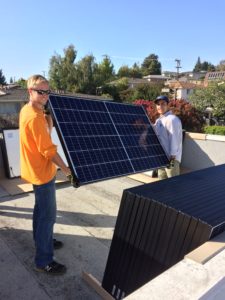 Liam Weaver graduated from the CEE Department in 2016, earned an MS degree from the University of California, Berkeley, and then was hired by the California Public Utilities Commission conducting engineering analysis behind California’s renewable energy, smart cities, and electric vehicle infrastructure policies. We caught up with him to find out more about his new position and how UT prepared him for this exciting career.
Liam Weaver graduated from the CEE Department in 2016, earned an MS degree from the University of California, Berkeley, and then was hired by the California Public Utilities Commission conducting engineering analysis behind California’s renewable energy, smart cities, and electric vehicle infrastructure policies. We caught up with him to find out more about his new position and how UT prepared him for this exciting career.
What does your job at the CPUC entail?
Weaver: I am an engineer working for the state of California to advocate for California ratepayers and help achieve California’s renewable energy and electric vehicle goals.
My day-to-day is extremely varied. I do everything from technical engineering analysis to presenting my recommendations to decision makers and testifying in hearing.
Here’s a short breakdown of tasks:
Power system analysis: running and interpreting optimization models for renewable energy and energy storage procurement.
Electric vehicle grid integration: working with industry experts to develop communication protocols between electric vehicle inverters, charging infrastructure, and grid aggregators or operators.
Distributed Energy Resource Interconnection: developing phased smart inverter functions to provide automated reliability controls for DERs.
There is also a lot of reading and writing, articulating technical concepts to non-technical people, deciphering acronyms, cost estimating, and elements of negotiation. I represent the citizens and ratepayers of California and advocate for the most societally beneficial and cost-effective decisions.
Can you give an example of a recent project that posed a unique challenge or is otherwise notable?
Weaver: A recent, long-term challenging project I’ve been working on is Vehicle Grid Integration (VGI). The goal of VGI is to ensure the electric grid can accommodate the governor’s planned 5 million electric vehicles on the road by 2030. Electric vehicles use a lot of energy, and an increasingly renewable grid dictates when energy is readily available. As part of addressing these challenges, I help oversee billions of dollars in potential funding for EV charging infrastructure projects and the communications pathways and load management plans for those vehicles.
The goal is to enable EVs to consume energy when it’s being produced by the sun and the wind without disrupting transportation. There’s even a potential to store this energy in the EV batteries when the sun is shining and then discharge back to the grid when people come home at night and ramp up their energy use. What makes this ongoing project so challenging is there’s no clear black-and-white solution; it’s often not clear what the exact problem or solution will be since this has never been done before.
What do you love most about your position and where you work?
Weaver: What I love most about my job is the impact and significance of this work. Much of the world is watching and learning from us to see if we can achieve a clean energy system of 100% renewable energy and zero emission vehicles – something that has literally never been done before in the history of humankind. As a result of this unique grand engineering challenge, I am able to work alongside experts and have the potential to influence the outcome of important decisions regarding the future of our energy system.
How did UT set you up for both landing the job and being successful in your position?
Weaver: I owe a lot to UT’s professors. I was fortunate to have some amazing mentors throughout my time at UT that pushed me and advised me to land my graduate school position at UC Berkeley and then jumpstart my career afterwards. UT helped me to build a well-rounded portfolio of practical skills including leadership, communication, problem-solving, project management, and cross-disciplinary teamwork, skills which are transferrable to any career. All of these aspects of practical, problem-solving thinking, excellent mentorship, and well-rounded communication I experienced at UT have supported my career success.